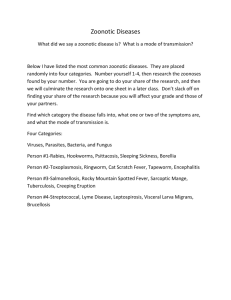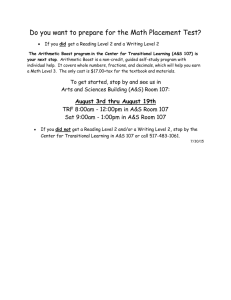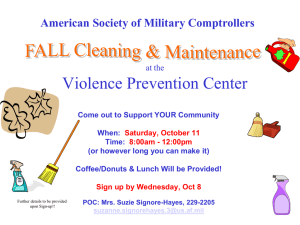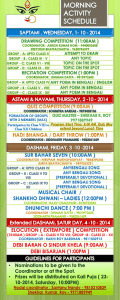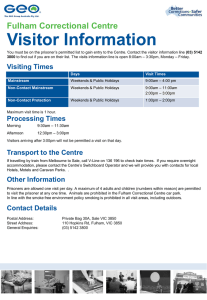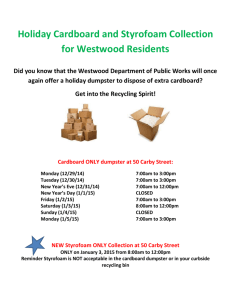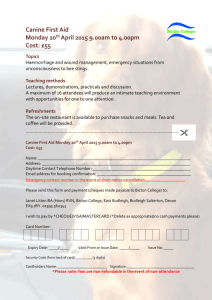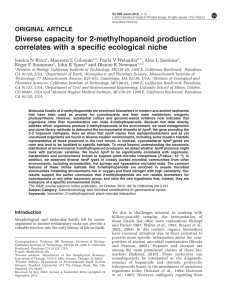An Introduction to Entomology, Zoonotic
advertisement
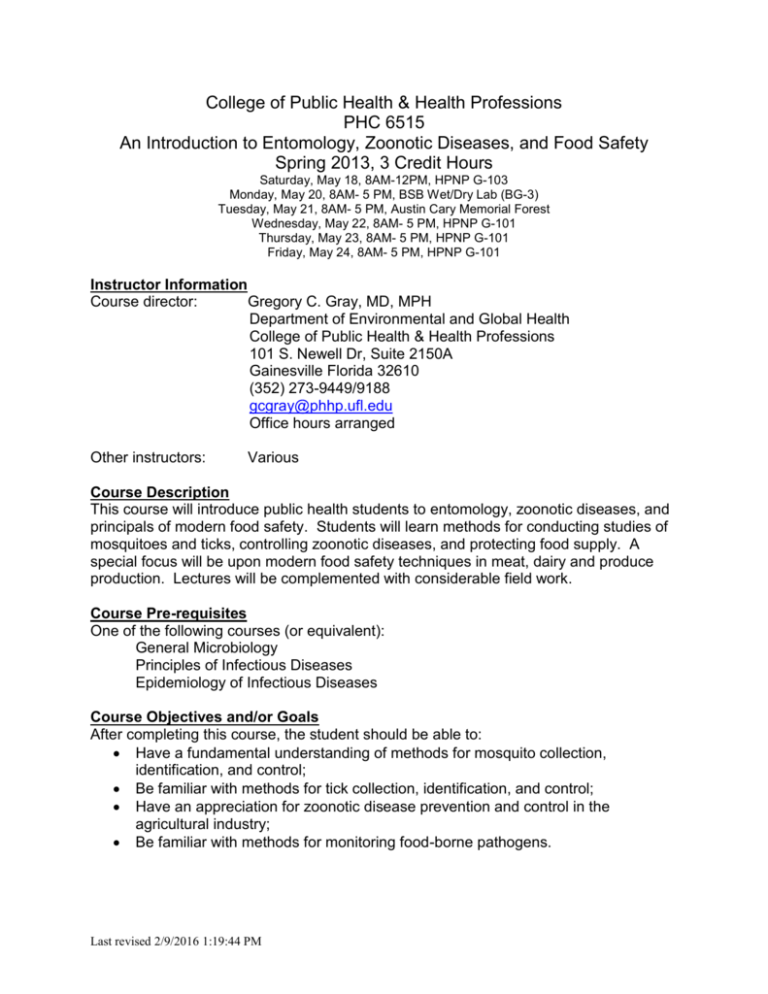
College of Public Health & Health Professions PHC 6515 An Introduction to Entomology, Zoonotic Diseases, and Food Safety Spring 2013, 3 Credit Hours Saturday, May 18, 8AM-12PM, HPNP G-103 Monday, May 20, 8AM- 5 PM, BSB Wet/Dry Lab (BG-3) Tuesday, May 21, 8AM- 5 PM, Austin Cary Memorial Forest Wednesday, May 22, 8AM- 5 PM, HPNP G-101 Thursday, May 23, 8AM- 5 PM, HPNP G-101 Friday, May 24, 8AM- 5 PM, HPNP G-101 Instructor Information Course director: Gregory C. Gray, MD, MPH Department of Environmental and Global Health College of Public Health & Health Professions 101 S. Newell Dr, Suite 2150A Gainesville Florida 32610 (352) 273-9449/9188 gcgray@phhp.ufl.edu Office hours arranged Other instructors: Various Course Description This course will introduce public health students to entomology, zoonotic diseases, and principals of modern food safety. Students will learn methods for conducting studies of mosquitoes and ticks, controlling zoonotic diseases, and protecting food supply. A special focus will be upon modern food safety techniques in meat, dairy and produce production. Lectures will be complemented with considerable field work. Course Pre-requisites One of the following courses (or equivalent): General Microbiology Principles of Infectious Diseases Epidemiology of Infectious Diseases Course Objectives and/or Goals After completing this course, the student should be able to: Have a fundamental understanding of methods for mosquito collection, identification, and control; Be familiar with methods for tick collection, identification, and control; Have an appreciation for zoonotic disease prevention and control in the agricultural industry; Be familiar with methods for monitoring food-borne pathogens. Last revised 2/9/2016 1:19:44 PM Course Materials Required text: Krauss H, Weber A, Appel M, Enders B, Isenberg HD, Schiefer HG, Slenczka W, Von Graevenitz A, Zahner H. editors. Zoonoses. Infectious Diseases Transmissible from Animals to Humans, 3rd edition. ASM Press, 2003, ISBN:1555812368 Course Requirements/Evaluation/Grading Students will be evaluated by their class participation (33%) and a 90-minute, open book, open notes, examination (33%), and a 7-10 page term paper on a single zoonotic disease problems the student’s home country (33%) due by mid July. To earn a B for class participation, students should fully participate and attend every session. To earn an A in classroom participation, students must attend each session and demonstrate that they prepared for lectures/fieldtrips beforehand (through reading assigned text and interacting with the lecturers). Percentag e or points earned in class Letter Grade equivalent Letter Grade Grade Point s 93%100 % 90% 92% 87% 89% 83% 86% 80% 82% 77% 79% 73% 76% 70% 72% 67% 69% 63% 66% 60% 62% A A- B+ B B- C+ C C- D+ D D- Belo w 60% E A A- B+ B B- C+ C C- D+ D D- E WF I NG 4. 0 3.67 3.33 3.0 2.67 2.33 2.0 1.67 1.33 1.0 0.67 0.0 0.0 0.0 0.0 SU 0.0 For greater detail on the meaning of letter grades and university policies related to them, see the Registrar’s Grade Policy regulations at http://www.registrar.ufl.edu/catalog/policies/regulationgrades.html Topical Outline Day/Lecture Saturday 8AM HPNP G-103 Title Welcome, course introduction (10 min) Lecturer Readings (pages) Saturday 8:10-9AM One Health Gray Zoonotic influenza and occupational Saturday 9-11 risk Gray 133-139 Other zoonotic diseases among avian species and food safety (salmonellosis, chlamydiosis, colibacillosis, campylobcteriosis, 188-89, 191-193, Saturday 11-12 etc.) Barr 196-200, 234-237 Mosquito and Tick Borne Diseases (Lectures covering basic biology, life cycle, habitats, surveillance methods) Monday xi-xiv, 49-51, 48.00AM Vet Med Introduction to lectures Okech 14;27-31;46-48 Last revised 2/9/2016 1:19:44 PM 2 Day/Lecture Basic Science Bldg Room BG-3 8:15 – 9:00AM Title Lecturer Mosquito biology and anatomy Mosquito-borne diseases/ Okech 9:00 - 9:45AM 9:45 - 10:30AM Okech Houseflies: Diseases and their control LCDR Doud CDR Obenauer, LCDR Stoops LT Wright 11:00 - 12:00PM Mosquito surveillance methods & identification resources Lab session: Mosquito identification and dissection 12:00 - 1:00PM Lunch break 1:00 - 1:30PM 1:30 - 2:00PM Tick biology and life cycles Tick-borne diseases Lord/Allan Lord/Allan 2:00 - 2:30PM Surveillance methods for ticks Lord/Allan 2:30 - 3:00PM Methods for tick control Lab session: Tick identification/dissection Lord/Allan 10:30 - 11:00AM 3:00P - 4:30PM Readings (pages) Okech, Maha Lord, Allan Mosquito and Tick Field Work Bus to Austin Cary Memorial Learning Center, Waldo Road (takes about 30min to Tuesday get there in traffic) All students to wear long sleeve shirts and trousers, light 7:15AM - 7:45AM colored clothing better. It may be muddy. 8:00AM - 8:30Am Adult mosquito trapping techniques, mosquito trap set up and collection of traps 8:30AM - 9:00AM Dipping and collection techniques for mosquito larvae 9:00AM - 9.30AM Chemical control of mosquitoes and ticks - equipment overview 9:30AM -10:00AM 10:00AM -11:00AM 11:00AM - 1:00PM Mosquito control - ULV and Space spray demonstrations Tick control - Broadcast insecticide application demonstrations Preliminary identification of wild caught mosquitoes (larvae, Last revised 2/9/2016 1:19:44 PM Okech, LCDR Stoops; LT Wright, LT McDonough, LT Harwood, HM1 Francona, HM2 Denson Okech, LCDR Stoops, HM2 Denson, Mr. Vince Smith, Mr. Ray Platt, EN1 Anderson Mr. Vince Smith, Mr. Ray Platt, EN1 Anderson Mr. Vince Smith, Mr. Ray Platt, EN1 Anderson Okech, LCDR Stoops, CDR 3 Day/Lecture 1:00 PM - 2:00PM 2:00PM - 3:00PM 3:00PM - 4:00PM Title Lecturer adults) Obenauer, LT Wright, LT McDonough, LT Harwood, HM1 Francona, HM2 Denson Lunch break Tick sampling methods: tick drag, CO2 bait Preliminary ID of ticks Readings (pages) Lord/Allan Lord/Allan Zoonotic Diseases & Food Safety I Wednesday 8AM Introduction to meat production Wednesday 9-12AM Nettles Sausage Company 190 SW County Road 240 Lake City, FL 32025-3607 Prof Chad Carr Prof Chad Carr Meat laboratory Please remember do not wear opentoed shoes, high heels, and jewelry Gray 176-179 Lunch on the bus ride back to UF Wednesday 1-2PM HPNP G-101 Wednesday 2-3PM HPNP G-101 Wednesday 3-4PM HPNP G-101 Diseases due to bartenella species Zoonoses of concern from Florida’s State Veterinarian Aquaculture and aquatic zoonoses Reducing the risk of zoonotic disease transmission in the dairy industry. An outbreak of Brucella Wednesday 4-5PM HPNP G-101 melitensis in humans and goats. Zoonotic Diseases & Food Safety II Bus leaves hotel at for Pilgrim’s Pride Corporation 19740 US90, Live Thursday 8:00AM Oak, FL 32060-8753, tel 386-3622544 (modern poultry production; arrive 9AM) Pilgrim’s Pride Corporation Thursday 10-12AM Blackmore Waltzek Hernandez 203-5, 185-9, 205-7, 229-231, 234-6, 278-80 Gray Host – Tara Martin QA Manager, Live Oak Facility Cell 386-209-3842 Lunch on the bus ride back to UF Thursday 1:30-2:30PM HPNP G-101 Thursday 2:30-3:30PM HPNP G-101 Thursday 3:30-5:30PM HPNP G-101 Zoonotic diseases and wildlife Zoonotic infections associated with domestic pets (hookworm, toxoplasmosis, salmonellosis Small group zoonotic disease exercise Isaza Krueger 307-312, 362, 369 Gray Zoonotic Diseases & Food Safety III Last revised 2/9/2016 1:19:44 PM 4 Day/Lecture Friday 7:30AM / 9-11:30AM Friday 1-2PM HPNP G-101 Friday 2-3PM HPNP G-101 Friday 3-5PM HPNP G-101 Title Bus to North Florida Holsteins 2740 West County Rd 232 Bell, FL 326197174, tel 352-463-7174 (modern dairy farm; arrive 10AM) 3522137013 gotmilk10@aol.com North Florida Holsteins Lunch on the bus ride back to UF Uncommon zoonoses: Hendra virus, Nipah virus, foot & mouth disease, Streptococcus suis. Lyme disease & giardiasis Final exam (90 minutes, multiple choice, open notes) bring calculator Lecturer Readings (pages) Gray Host - David Temple (Diary Manager) Rowland 123-127; 141-143 Gray 180-183; 280-282 Gray Statement of University’s Honesty Policy (cheating and use of copyrighted materials) Each student is bound by the academic honesty guidelines of the University and the student conduct code printed in the Student Guide and on the University website. The Honor Code states: “We, the members of the University of Florida community, pledge to hold ourselves and our peers to the highest standards of honesty and integrity." Cheating or plagiarism in any form is unacceptable and inexcusable behavior. Attendance Policy Attendance is mandatory. Policy Related to Make-up Exams or Other Work Attendance and Make-up Work – I expect you to attend and be prepared to participate in all class sessions. Personal issues with respect to class attendance or fulfillment of course requirements will be handled on an individual basis. Statement Related to Accommodations for Students with Disabilities Accommodations for Students with Disabilities If you require classroom accommodation because of a disability, you must first register with the Dean of Students Office (http://www.dso.ufl.edu/). The Dean of Students Office will provide documentation to you, which you then give to the instructor when requesting accommodation. The College is committed to providing reasonable accommodations to assist students in their coursework. Counseling and Student Health Students may occasionally have personal issues that arise in the course of pursuing higher education or that may interfere with their academic performance. If you find Last revised 2/9/2016 1:19:44 PM 5 yourself facing problems affecting your coursework, you are encouraged to talk with an instructor and to seek confidential assistance at the University of Florida Counseling Center, 352-392-1575, or Student Mental Health Services, 352-392-1171. Visit their web sites for more information: http://www.counsel.ufl.edu/ or http://www.health.ufl.edu/shcc/smhs/index.htm#urgent The Student Health Care Center at Shands is a satellite clinic of the main Student Health Care Center located on Fletcher Drive on campus. Student Health at Shands offers a variety of clinical services, including primary care, women's health care, immunizations, mental health care, and pharmacy services. The clinic is located on the second floor of the Dental Tower in the Health Science Center. For more information, contact the clinic at 392-0627 or check out the web site at: www.health.ufl.edu/shcc Crisis intervention is always available 24/7 from: Alachua County Crisis Center: (352) 264-6789. BUT – Do not wait until you reach a crisis to come in and talk with us. We have helped many students through stressful situations impacting their academic performance. You are not alone so do not be afraid to ask for assistance. Last revised 2/9/2016 1:19:44 PM 6
